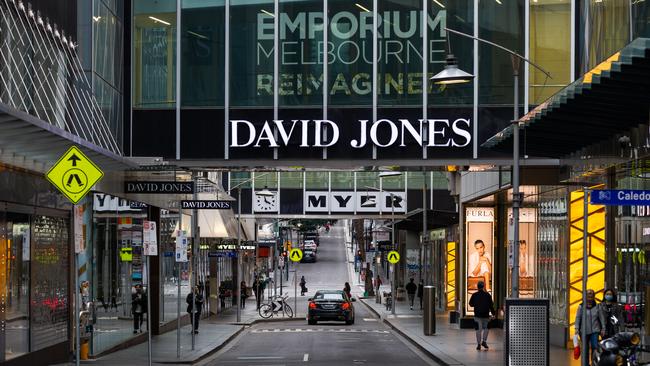Lockdown to trigger more loan distress
A six-week Melbourne lockdown is set to trigger a fresh wave of loan deferral requests from small and mid-sized businesses

A six-week Melbourne lockdown is set to trigger a fresh wave of loan deferral requests from small and mid-sized businesses as it emerged that nearly 20 per cent of business loans have been temporarily frozen by banks, as the nation endures the worst economic downturn since the Great Depression.
Repayments on one-in-five small and medium-sized business loans and more than 10 per cent of home loans have been deferred by the banks, according to new data from the financial regulator that shed further light on the depth of the crisis facing households and the small business.
Peter Strong, the CEO of the Council of Small Business Organisations Australia, said the Melbourne lockdown would push some businesses to the wall.
“There were some that would have been saying, ‘maybe I don’t need a deferral’, and now, bang, six weeks. So they’ll be going to their bank looking to defer their repayments,” Mr Strong said.
The nation’s banks deferred 18 per cent of small business loans worth $56bn and mortgages worth $192bn up to May 31, the Australian Prudential Regulation Authority revealed on Thursday.
Australia’s top 20 lenders have in total approved $266bn worth of loan repayment deferrals, or 10 per cent of all loans, according to the APRA data, with the bulk of requests flooding in through April before tapering off in May.
Analysts at Morgan Stanley expressed similar concerns, flagging that the return to lockdown measures significantly increased business outlook uncertainty.
“Many that are being forced to close for a second time are likely to shut down the business for good. This is especially likely for less liquid small businesses.
“A higher rate of business closures will have long-lasting impacts on the economic recovery — increasing … longer-term unemployment and reducing economic capacity once lockdown measures are again removed,” they wrote in a note to clients.
A staggering 34 per cent of the home loan deferrals, meanwhile, were for investor loans, according to the figures from the regulator. Interest-only loans accounted for 14 per cent of the repayment holidays, while 8 per cent of deferrals went to mortgage holders with loan-to-value ratios of greater than 90 per cent.
The spike in investor deferrals could soon translate to a wave of distressed selling in the market, with anecdotal reports coming through that the banks are already pushing stressed property investors to reduce their holdings.
The new figures, which underscore the magnitude of the hit to the economy from the coronavirus crisis, came a day after Treasurer Josh Frydenberg flagged the prospect of bringing forward personal income tax cuts as the nation contends with a $6bn hit from Melbourne’s six-week shutdown.
The tax cuts, which are due to come into force at the start of the 2022 financial year, will lift the threshold for the 19 per cent tax rate from $41,000 to $45,000 and the threshold for the 32.5 per cent rate from $90,000 to $120,000.
“We are looking at that issue and the timing of those tax cuts,” Mr Frydenberg told ABC radio.
“We do want to boost aggregate demand, boost consumption, put more money in people‘s pockets, and that’s one way to do it.”
Mr Frydenberg is due to deliver his next economic update on July 23, at which point he will also outline the government’s income support plans once the JobKeeper and JobSeeker supplements come to an end.
The APRA data came after banks outlined an extra four-month loan deferral period for borrowers unable to restart payments, bringing to 10 months the total length of deferrals for households and businesses struggling through the crisis.
Commonwealth Bank CEO Matt Comyn on Wednesday said the decision was taken to reduce the disruption to the economy.
“Obviously the co-ordination of the government, particularly with APRA, is trying to make sure it’s not a cliff and it is an orderly transition, and we want to be able to direct support to customers who need it most,” he said.
Economists and bank analysts have become increasingly concerned about the impact on households and small businesses if the assistance comes to an abrupt end in September.
In a letter published on Thursday and released alongside the loan deferral figures, APRA deputy chair John Lonsdale told banks the regulator expected them to engage with affected borrowers before the end of the deferral period to determine whether to grant an extension on the deferral, restructure the loan or to recognise it as impaired.
Lenders should be encouraging borrowers that can restart repayments to do so, Mr Lonsdale added.
But Mr Comyn warned there were difficult decisions ahead for the bank’s customers who could not resume paying their loans.
“Customers who were distressed pre-COVID — we’ve said for some time — it would be very challenging post-COVID,” he told ABC Radio National.
“We’ve demonstrated a lot of flexibility. That can’t continue indefinitely.”
CBA has so far granted deferrals on 120,000 mortgage loans and 60,0000 business loans.
Further underpinning the shaky outlook for the property sector was the value of home loan approvals in May, which fell by a seasonally adjusted 11.6 per cent from April, according to new data from the Bureau of Statistics.
The value of loans for investment housing fell 15.6 per cent over the month, while the value of loans for owner-occupied mortgages fell 10.2 per cent.


